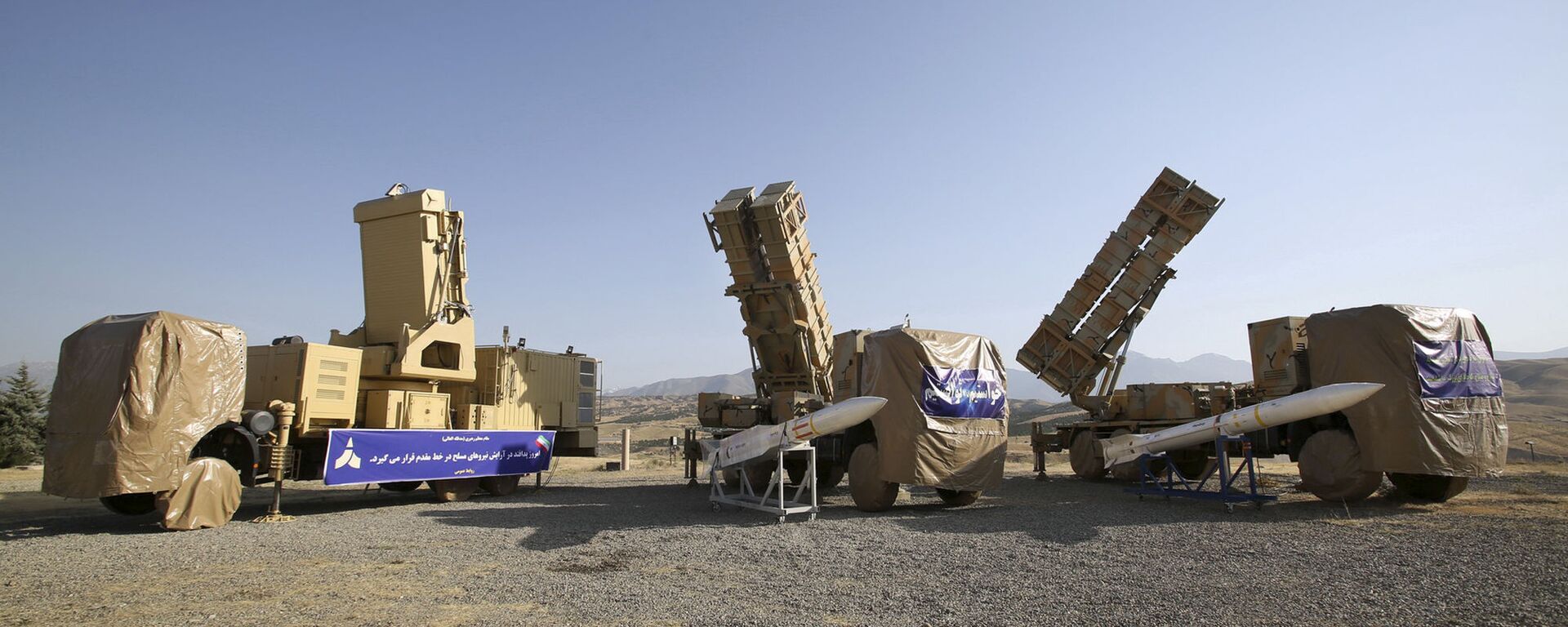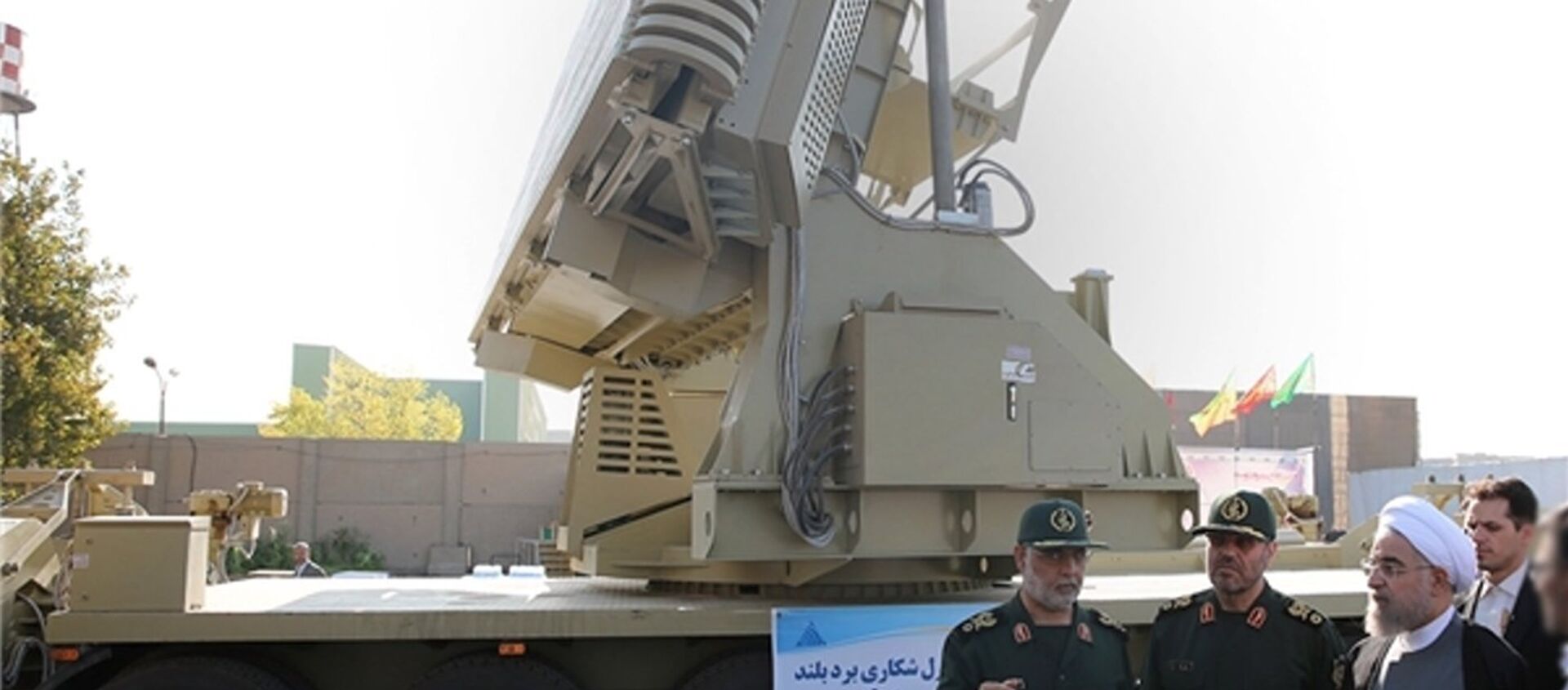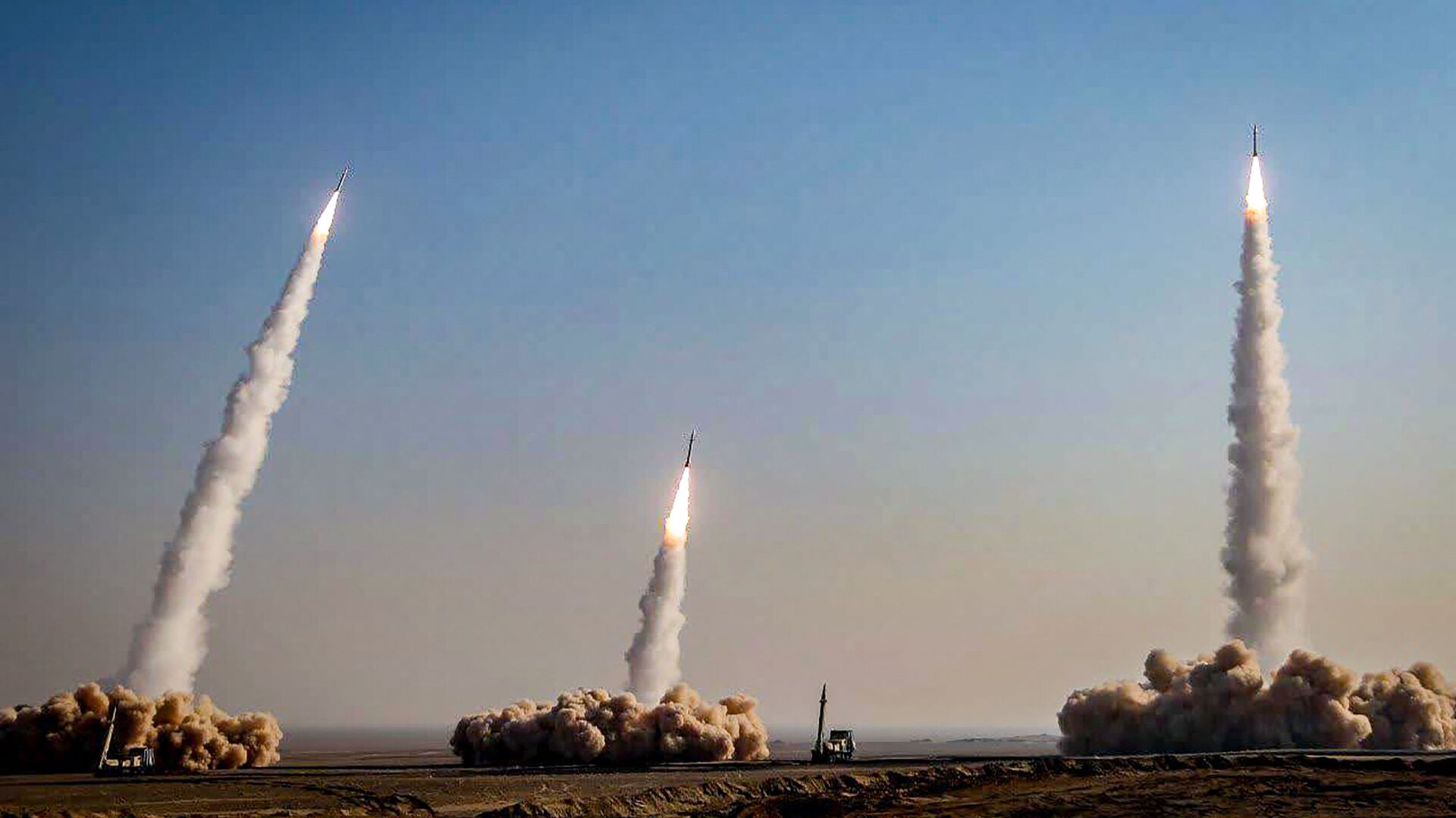https://sputnikglobe.com/20210904/irgc-aerospace-force-to-team-up-with-irans-defence-ministry-to-upgrade-countrys-missile-power-1083796700.html
IRGC Aerospace Force to Team Up With Iran's Defence Ministry to Upgrade Country's Missile Power
IRGC Aerospace Force to Team Up With Iran's Defence Ministry to Upgrade Country's Missile Power
Sputnik International
Iran has one of the largest and most sophisticated defence industries in the Middle East, and has created a wide range of short, medium and long-range missile... 04.09.2021, Sputnik International
2021-09-04T15:14+0000
2021-09-04T15:14+0000
2021-09-04T18:19+0000
middle east
world
newsfeed
https://cdn1.img.sputnikglobe.com/img/07e5/04/09/1082583937_0:131:2500:1537_1920x0_80_0_0_3f1e49736040287e97457f608747f290.jpg
Iran’s Islamic Revolutionary Guard Corps (IRGC) will work with the country’s defence ministry to improve the country’s missile power further, Brig. Gen. Amir-Ali Hajizadeh, the commander of the IRGC’s Aerospace Division, has said.Hajizadeh stressed that the defence ministry “can play an effective and decisive role in enhancing the defence capabilities of the IRGC Aerospace Force.”Ashtiani responded by saying that his ministry was ready to interact and cooperate with Hajizadeh’s command, emphasising that “considering the vast industrial and production capabilities in the defence ministry, we will be able to make great strides in meeting the defence and military needs of the Armed Forces, especially the IRGC Aerospace Force.”Iran’s parliament approved Ashtiani and other officials in President Ebrahim Raisi’s cabinet in late August, with the new government formed in the wake of elections held in June, which Raisi won in a landslide. Before his appointment to the post of defence minister, Ashtiani served as deputy chief of the armed forces, and as deputy commander-in-chief of the army.Hajizadeh has been the commander of the IRGC Aerospace Force since 2009, and has overseen dramatic improvement in its armaments and capabilities. The Aerospace Force controls the country’s strategic missile force, has its own aviation, as well as advanced medium-range and point-defence anti-aircraft missile systems. The force also has its own space programme, and successfully launched a military satellite known as the Noor into orbit in Spring 2020. The Pentagon initially derided the satellite as a mere “tumbling webcam in space”, “unlikely” to provide Tehran with any useable intelligence, only to have their words thrown back at them after Iran released high-resolution images of Al-Udeid Air Base - the Qatar-based home of US Central Command - snapped by the Noor.Iran has jealously guarded its missile capabilities against foreign attempts to regulate them via treaty. After pulling out of the Iran nuclear deal in 2018, US President Donald Trump boasted about being able to create a “better” nuclear deal that would include restrictions on Iran’s missiles. The Biden administration similarly sought to add a sentence about Iran’s missiles and regional activities in nuclear talks in Vienna earlier this year.Iranian officials have rejected any attempts to put restrictions on the country’s missile capabilities, stressing that they are perfectly legal under international law, and that they serve to protect Iran against possible enemy attack by a regional or global adversary such as Israel or the United States. Iran does not disclose exactly how many missiles of various ranges it has at its disposal. However, the Washington-based Center for Strategic and International Studies recently estimated that the Islamic Republic possesses “the largest and most diverse missile arsenal in the Middle East,” with its inventory consisting of “thousands of ballistic and cruise missiles, some capable of striking as far as Israel and south-east Europe.”
https://sputnikglobe.com/20210901/iran-unveils-new-components-of-air-defence-systems-capable-of-detecting-stealth-aircraft-1083768515.html
https://sputnikglobe.com/20210823/iran-boasts-newest-version-of-bavar-373-air-defense-system-is-better-than-russias-s-400-1083695915.html
Sputnik International
feedback@sputniknews.com
+74956456601
MIA „Rosiya Segodnya“
2021
News
en_EN
Sputnik International
feedback@sputniknews.com
+74956456601
MIA „Rosiya Segodnya“
Sputnik International
feedback@sputniknews.com
+74956456601
MIA „Rosiya Segodnya“
middle east, newsfeed
IRGC Aerospace Force to Team Up With Iran's Defence Ministry to Upgrade Country's Missile Power
15:14 GMT 04.09.2021 (Updated: 18:19 GMT 04.09.2021) Iran has one of the largest and most sophisticated defence industries in the Middle East, and has created a wide range of short, medium and long-range missile systems which officials say serve to guarantee regional security and prevent foreign aggression. The US and its allies have repeatedly sought to rein in these missile systems via a treaty.
Iran’s Islamic Revolutionary Guard Corps (IRGC) will work with the country’s defence ministry to improve the country’s missile power further, Brig. Gen. Amir-Ali Hajizadeh, the commander of the IRGC’s Aerospace Division, has said.
“God willing, cooperation in the field of upgrading the IRGC’s missile power will be expanded during the new term of the defence ministry,” Hajizadeh said, speaking to newly appointed defence minister Brig. Gen. Mohammad Reza Ashtiani in a meeting with other military officials on Saturday.
Hajizadeh stressed that the defence ministry “can play an effective and decisive role in enhancing the defence capabilities of the IRGC Aerospace Force.”
Ashtiani responded by saying that his ministry was ready to interact and cooperate with Hajizadeh’s command, emphasising that “considering the vast industrial and production capabilities in the defence ministry, we will be able to make great strides in meeting the defence and military needs of the Armed Forces, especially the IRGC Aerospace Force.”
The new minister stressed that “meeting all the needs of the IRGC Aerospace Force” would be “the priority” of his ministry.

1 September 2021, 11:27 GMT
Iran’s parliament
approved Ashtiani and other officials in President Ebrahim Raisi’s cabinet in late August, with the new government formed in the wake of elections held in June, which Raisi won in a landslide. Before his appointment to the post of defence minister, Ashtiani served as deputy chief of the armed forces, and as deputy commander-in-chief of the army.
Hajizadeh has been the commander of the IRGC Aerospace Force since 2009, and has overseen dramatic improvement in its armaments and capabilities. The Aerospace Force controls the country’s strategic missile force, has its own aviation, as well as advanced medium-range and point-defence anti-aircraft missile systems. The force also has its own space programme, and successfully launched a military satellite known as the Noor into orbit in Spring 2020. The Pentagon initially derided the satellite as a mere “tumbling webcam in space”, “unlikely” to provide Tehran with any useable intelligence, only to have their words thrown back at them
after Iran released high-resolution images of Al-Udeid Air Base - the Qatar-based home of US Central Command - snapped by the Noor.
Iran has jealously guarded its missile capabilities against foreign attempts to regulate them via treaty. After pulling out of the Iran nuclear deal in 2018, US President Donald Trump boasted about being able to create a “better” nuclear deal that would include restrictions on Iran’s missiles. The Biden administration similarly sought to add a sentence about Iran’s missiles and regional activities in nuclear talks in Vienna earlier this year.

23 August 2021, 20:22 GMT
Iranian officials have rejected any attempts to put restrictions on the country’s missile capabilities, stressing that they are perfectly legal under international law, and that they serve to protect Iran against possible enemy attack by a regional or global adversary such as Israel or the United States. Iran does not disclose exactly how many missiles of various ranges it has at its disposal. However, the Washington-based Center for Strategic and International Studies
recently estimated that the Islamic Republic possesses “the largest and most diverse missile arsenal in the Middle East,” with its inventory consisting of “thousands of ballistic and cruise missiles, some capable of striking as far as Israel and south-east Europe.”






